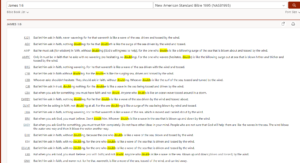One way to gain a better understanding of the range of meaning of a Biblical word is to compare translations. How do different versions of the Bible translate the Hebrew or Greek word? A helpful resource for this kind of comparison is BibleGateway (https://www.biblegateway.com/).
When you look up a single verse, one of the options below the verse is “in all English translations.” Clicking that link will display fifty or more translations, from King James to the Message.
Another approach uses the BibleHub “Interlinear” option:
https://biblehub.com/interlinear/study/
For example, in James 1:6 the word “doubt” is used twice. While the meaning of “doubt” may seem obvious, at least one scholar says that this word is part of a “command that has often been misinterpreted in the history of the church.”[1]
Unfortunately, in this case, comparing translations is not very helpful. On BibleGateway, all but two or three translations of James 1:6[2] use the same English word, “doubt.”
Now of course, this might mean that this is the only possible interpretation of the Greek word. OR it could mean that the range of meaning of the word in Greek doesn’t have a simple, one-word equivalent.[3] BibleHub (as well as other web or print resources) can help you dig a little deeper to understand God’s Word.
On the BibleHub Interlinear page enter the verse (or a longer passage) you want to explore. In this example, the verse is James 1:6.
The verse is displayed in both English and the original language (Greek in the New Testament). Find the word you want to investigate in the English. (The other features available on the interlinear BibleHub are explained elsewhere).
Above the English word, click the transliterated Greek word (the one in English letters).
Click the label “Strong’s Greek” (for Strong’s Exhaustive Concordance of the Bible). The numerical value is an index for that word.
The dictionary form of the word (diakrinó) is shown at the top of the page.
Now you can scroll through numerous examples of the use of the word on the right column as well as other resources on the left column. For example, in addition to “doubt” diakrinó is translated as distinction, waver, different, decide, judge, discerning, etc.
Thus, the word used in James 1:6 has a range of meaning wider than simply the negative English idea of doubt. diakrinó is about evaluating evidence and analyzing circumstances and deciding how to respond.
James is probably thinking of a strong kind of doubting: a basic division within the believer that brings about wavering and inconsistency of attitude toward God.[4]
James is warning about overthinking his instruction at the beginning of his letter (vs. 2-4). We are to “Consider it all joy…” without requiring an understanding of exactly what God is doing or why. We are not to doubt the truth of James 1:2-4, that even in trials the endurance God is working in us is a cause for joy.
[1] Craig L. Blomberg, and Mariam J. Kamell, James, Exegetical Commentary on the New Testament (Grand Rapids, Michigan: Zondervan Publishing House, 2008), 52.
[2] https://www.biblegateway.com/verse/en/James%201:6
[3] For example, on BibleGateway, consider attempts to convey the meaning of the word James used:
Phillips, “secret doubts as to whether he really wants God’s help or not”
the EasyEnglishBible, “Do not have other ideas in your mind,”
the Message, “without a second thought.”
[4] Douglas Moo, The Letter of James (Grand Rapids, Michigan: William B. Eerdmans Publishing Company. 2000), 60.






